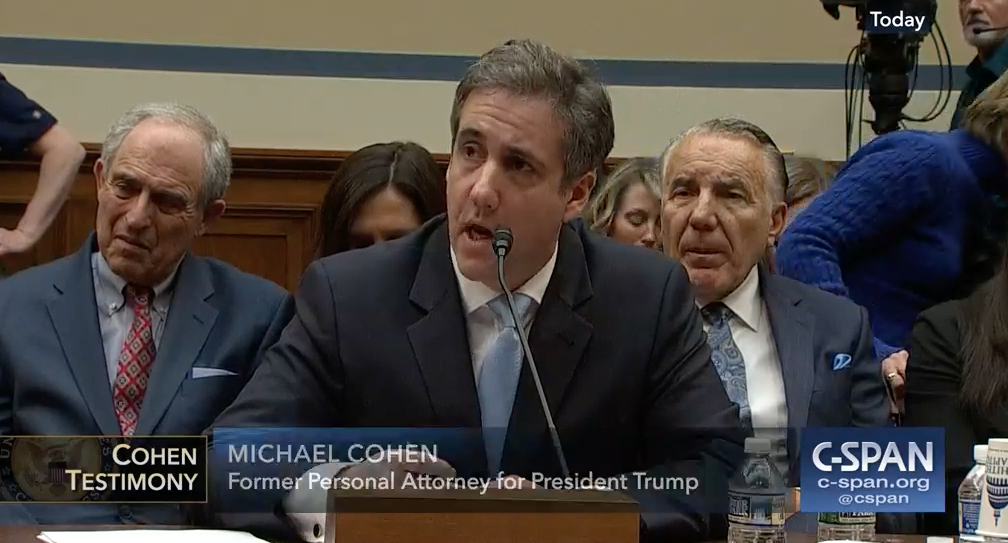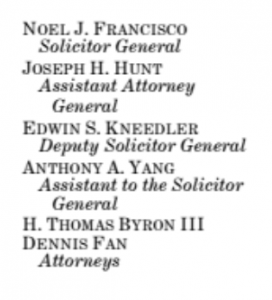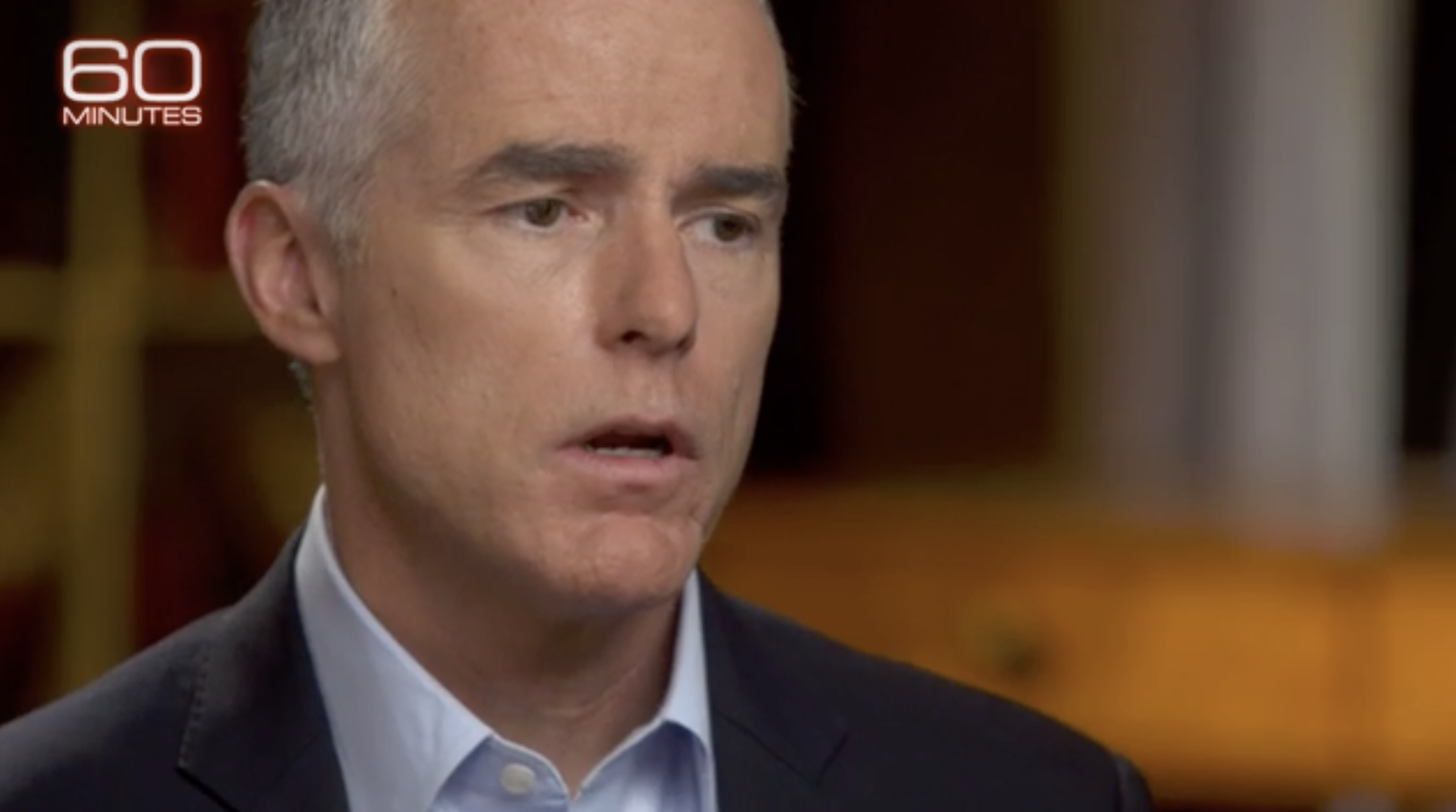I’m still pretty cranky about the timing and form of Andrew McCabe’s publicity tour.
But since it’s out there, I’d like to comment on three details, two of which have gotten significant comment elsewhere.
Trump wanted Rod Rosenstein to include Russia in the reasons he should fire Comey
The first is that Trump specifically asked Rosenstein to include Russia — McCabe doesn’t further specify what he meant — in the letter recommending he fire Jim Comey.
McCabe says that the basis for both investigations was in Mr. Trump’s own statements. First, Mr. Trump had asked FBI Director Comey to drop the investigation of National Security Adviser Michael Flynn, who has since pleaded guilty to lying to the FBI about his Russian contacts. Then, to justify firing Comey, Mr. Trump asked his deputy attorney general, Rod Rosenstein, to write a memo listing the reasons Comey had to go. And according to McCabe, Mr. Trump made a request for that memo that came as a surprise.
Andrew McCabe: Rod was concerned by his interactions with the president, who seemed to be very focused on firing the director and saying things like, “Make sure you put Russia in your memo.” That concerned Rod in the same way that it concerned me and the FBI investigators on the Russia case.
If Deputy Attorney General Rosenstein listed the Russia investigation in his memo to the White House, it could look like he was obstructing the Russia probe by suggesting Comey’s firing. And by implication, it would give the president cover.
Scott Pelley: He didn’t wanna put Russia in his memo.
Andrew McCabe: He did not. He explained to the president that he did not need Russia in his memo. And the president responded, “I understand that, I am asking you to put Russia in the memo anyway.”
When the memo justifying Comey’s firing was made public, Russia was not in it. But, Mr. Trump made the connection anyway, telling NBC, then, Russian diplomats that the Russian investigation was among the reasons he fired Comey.
The most obvious explanation for this is that Trump wanted to box DOJ in, to prevent them from expanding their investigative focus from one campaign foreign policy advisor, a second campaign foreign policy advisor, his former campaign manager, his National Security Advisor, and his lifelong political advisor to the one thing those five men had in common, Trump.
But it’s also possible that Trump wanted Rosenstein to do what Don McGahn had narrowly prevented Trump from doing, effectively shifting the obstruction to Rosenstein. That seems like what Rosenstein was worried about, an impression he may have gotten from his instructions from McGahn, laying out the case that investigating Russia would get you fired.
It’s possible, too, that Trump was particularly interested in the public statement for the benefit of the Russians, a view supported by the fact that Trump made sure he fired Comey before his meeting with Sergey Lavrov and Sergey Kislyak, and then stated that he had more freedom with Comey gone. That is, it’s possible he needed to prove to the Russians that he could control his own DOJ.
The order to Rosenstein was one of the predications for the investigation into Trump
McCabe elaborates on a story told at least partly by the Peter Strzok-Lisa Page texts: that the day after Trump fired Comey, FBI moved to open two investigations into Trump. A number of people have suggested McCabe just vaguely pointed to Trump’s statements, but he’s more specific than that. One of the statements was that order to Rosenstein to include Russia in the firing memo.
Scott Pelley: How long was it after that that you decided to start the obstruction of justice and counterintelligence investigations involving the president?
Andrew McCabe: I think the next day, I met with the team investigating the Russia cases. And I asked the team to go back and conduct an assessment to determine where are we with these efforts and what steps do we need to take going forward. I was very concerned that I was able to put the Russia case on absolutely solid ground in an indelible fashion that were I removed quickly or reassigned or fired that the case could not be closed or vanish in the night without a trace.
[snip]
Andrew McCabe: There were a number of things that caused us to believe that we had adequate predication or adequate reason and facts, to open the investigation. The president had been speaking in a derogatory way about our investigative efforts for weeks, describing it as a witch hunt…
President Trump on Feb. 16, 2017: Russia is a ruse. I have nothing to do with Russia. Haven’t made a phone call to Russia in years.
Andrew McCabe: …publicly undermining the effort of the investigation. The president had gone to Jim Comey and specifically asked him to discontinue the investigation of Mike Flynn which was a part of our Russia case. The president, then, fired the director. In the firing of the director, the president specifically asked Rod Rosenstein to write the memo justifying the firing and told Rod to include Russia in the memo. Rod, of course, did not do that. That was on the president’s mind. Then, the president made those public comments that you’ve referenced both on NBC and to the Russians which was captured in the Oval Office. Put together, these circumstances were articulable facts that indicated that a crime may have been committed. The president may have been engaged in obstruction of justice in the firing of Jim Comey.
As McCabe describes it, the other things are obstruction-related: Trump’s attacks on the Russian investigation.
But remember, McCabe had heard the substance of Mike Flynn’s comments to Sergei Kislyak. The rest of us have seen just outlines of it. In some way, Mike Flynn convinced Sergei Kislyak on December 29, 2016, that Russia had Trump’s assurances on sanctions relief. Trump may well have come up specifically. In any case, the FBI would have had good reason — from Flynn’s lies, and his call records showing his consultations before he lied — to suspect Trump had ordered Flynn’s statements to Kislyak.
McCabe describes the genesis of the obstruction and the counterintelligence investigation
Finally, McCabe provides additional details to the dual investigation into Trump: the obstruction one arising out of Trump’s efforts to kill the Russian investigation, and the counterintelligence one into whether Trump was doing that at Russia’s behest (which goes back to my initial point, that Trump may have wanted Russia included in the firing memos as a signal to Russia he could kill the investigation).
Andrew McCabe: …publicly undermining the effort of the investigation. The president had gone to Jim Comey and specifically asked him to discontinue the investigation of Mike Flynn which was a part of our Russia case. The president, then, fired the director. In the firing of the director, the president specifically asked Rod Rosenstein to write the memo justifying the firing and told Rod to include Russia in the memo. Rod, of course, did not do that. That was on the president’s mind. Then, the president made those public comments that you’ve referenced both on NBC and to the Russians which was captured in the Oval Office. Put together, these circumstances were articulable facts that indicated that a crime may have been committed. The president may have been engaged in obstruction of justice in the firing of Jim Comey.
Scott Pelley: What was it specifically that caused you to launch the counterintelligence investigation?
Andrew McCabe: It’s many of those same concerns that cause us to be concerned about a national security threat. And the idea is, if the president committed obstruction of justice, fired the director of the of the FBI to negatively impact or to shut down our investigation of Russia’s malign activity and possibly in support of his campaign, as a counterintelligence investigator you have to ask yourself, “Why would a president of the United States do that?” So all those same sorts of facts cause us to wonder is there an inappropriate relationship, a connection between this president and our most fearsome enemy, the government of Russia?
Scott Pelley: Are you saying that the president is in league with the Russians?
Andrew McCabe: I’m saying that the FBI had reason to investigate that. Right, to investigate the existence of an investigation doesn’t mean someone is guilty. I would say, Scott, if we failed to open an investigation under those circumstances, we wouldn’t be doing our jobs.
With that laid out, I’d like to look at Rod Rosenstein’s August 2 memo laying out precisely what Mueller was — and had, from the start — been authorized to investigate, which both Paul Manafort and the President’s flunkies in Congress spent a great deal of effort trying to unseal. Knowing as we now do that the redacted passages include at least one and probably two bullet points relating to Trump himself, it seems more clear than every that once you lay out the investigations into Trump’s flunkies known to have been predicated at the time, that’s all that would have been included in the memo:
- Obstruction investigation into Trump
- Counterintelligence investigation into Trump
- Election conspiracy investigation into Manafort
- Ukrainian influence peddling investigation into Manafort
- Transition conspiracy investigation into Flynn
- Turkish influence peddling investigation into Flynn
- Counterintelligence investigation into Carter Page
- Election conspiracy investigation into George Papadopoulos
- Election conspiracy investigation into Roger Stone
At that point, there wouldn’t have been space for at least two of the three bullets that now exist on a scope memo, as laid out by Jerome Corsi’s draft plea (though “c” may have been there in conjunction with Stone).
At the time of the interview, the Special Counsel’s Office was investigating the Russian government’s efforts to interfere in the 2016 presidential election, including:
a. the theft of campaign-related emails and other documents by the Russian government’s Main Intelligence Directorate of the General Staff (“GRU”);
b. the GRU’s provision of certain of those documents to an organization (“Organization 1”) for public release in order to expand the GRU’s interference in the 2016 U.S. presidential election campaign; and
c. the nature of any connections between individuals associated with the U.S. presidential campaign of Donald J. Trump (“Trump Campaign”) and the Russian government or Organization 1.
That’s another to believe — as I have long argued — that bullets a and b got moved under Mueller at a later time, probably around November 2017. After Flynn flipped, the Middle Eastern pass-through corruption would likely have been added, and inauguration graft probably got added after Rick Gates flipped (before the non-Russian parts of both got spun off).
One thing that means, if I’m correct, is that at the time Mueller was hired, the investigation consisted of predicated investigations into probably six individuals. While there would have been a counterintelligence and criminal aspect to both, there was a criminal aspect to each of the investigations, with specific possible crimes envisioned. If that’s right, it means a lot of hot air about Mueller’s appointment simply misunderstood what part of Comey’s confirmed investigation got put under Mueller at first.
I have been authorized by the Department of Justice to confirm that the FBI, as part of our counterintelligence mission, is investigating the Russian government’s efforts to interfere in the 2016 presidential election and that includes investigating the nature of any links between individuals associated with the Trump campaign and the Russian government and whether there was any coordination between the campaign and Russia’s efforts. As with any counterintelligence investigation, this will also include an assessment of whether any crimes were committed.
In any case, the certainty that there are at least one and probably two bullets pertaining to Trump in that August 2 memo is interesting for a few more reasons.
It makes it far more likely that the Strzok 302 — based on a July 19, 2017 interview, drafted the following day, and finalized August 22 — was an effort to formalize Mueller’s authorization to investigate the President. The part of the 302 that pertains to Mike Flynn’s interview takes up the middle third of the report. The rest must lay out the larger investigations, how the FBI found the intercepts between Flynn and Kislyak, and what the response to the interview was at DOJ.
The 302 is sandwiched between two events. First, it follows by just a few weeks the release of the June 9 meeting emails. Indeed, the interview itself took place on the day the NYT published the interview where Trump admits he and Putin spoke about adoptions — effectively making it clear that Putin, not Trump, drafted a statement downplaying that the meeting had established a dirt-for-sanctions relief quid pro quo.
The 302 was also drafted the day before Mueller started pursuing the transition emails and other comms from GSA that would have made it clear that Trump ordered Flynn’s statements and key members of the transition team knew that.
Specifically, on August 23, 2017, the FBI sent a letter (i.e., not a subpoena) to career GSA staff requesting copies of the emails, laptops, cell phones, and other materials associated with nine PTT members responsible for national security and policy matters. On August 30, 2017, the FBI sent a letter (again, not a subpoena) to career GSA staff requesting such materials for four additional senior PTT members.
It also happens to precede, by days, when Michael Horowitz would inform Christopher Wray and then Mueller about the Page-Strzok texts, though that is almost certainly an almost unbelievable coincidence.
In any case, as I’ve noted, unsealing that August 2 memo has been like a crown jewel for the obstructionists, as if they knew that it laid out the investigation into Donald Trump. That effort has been part of a strategy to suggest any investigation into Trump had to be improper, even one investigating whether he engaged in a quid pro quo even before the General Election started, trading US policy considerations — starting with, but not limited to, sanctions relief — in exchange for help getting elected.
The obstructionists want to claim that an investigation that started with George Papadopoulos and then Carter Page and then Mike Flynn (the obstructionists always seem to be silent about Paul Manafort and Roger Stone, as if they knew who engaged in substantive conspiracy with the Russians) should not end up with Donald Trump. And they do so, I think, to suggest that at the moment it discovered that quid pro quo in July 2017, it was already illegitimate.
But as McCabe said, “the FBI had reason to investigate that. Right, to investigate the existence of an investigation doesn’t mean someone is guilty. I would say, Scott, if we failed to open an investigation under those circumstances, we wouldn’t be doing our jobs.”
It just turned out that Trump was guilty.
As I disclosed last July, I provided information to the FBI on issues related to the Mueller investigation, so I’m going to include disclosure statements on Mueller investigation posts from here on out. I will include the disclosure whether or not the stuff I shared with the FBI pertains to the subject of the post.







